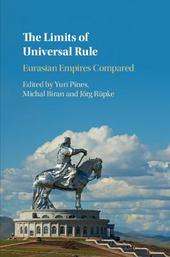
|
The Limits of Universal Rule: Eurasian Empires Compared
Paperback / softback
Main Details
| Title |
The Limits of Universal Rule: Eurasian Empires Compared
|
| Authors and Contributors |
Edited by Yuri Pines
|
|
Edited by Michal Biran
|
|
Edited by Joerg Rupke
|
| Physical Properties |
| Format:Paperback / softback | | Pages:411 |
|
| Category/Genre | World history
Historical geography |
|---|
| ISBN/Barcode |
9781108726825
|
| Classifications | Dewey:325.32095 |
|---|
| Audience | | Professional & Vocational | |
|---|
| Illustrations |
Worked examples or Exercises
|
|
Publishing Details |
| Publisher |
Cambridge University Press
|
| Imprint |
Cambridge University Press
|
| Publication Date |
15 December 2022 |
| Publication Country |
United Kingdom
|
Description
All major continental empires proclaimed their desire to rule 'the entire world', investing considerable human and material resources in expanding their territory. Each, however, eventually had to stop expansion and come to terms with a shift to defensive strategy. This volume explores the factors that facilitated Eurasian empires' expansion and contraction: from ideology to ecology, economic and military considerations to changing composition of the imperial elites. Built around a common set of questions, a team of leading specialists systematically compare a broad set of Eurasian empires - from Achaemenid Iran, the Romans, Qin and Han China, via the Caliphate, the Byzantines and the Mongols to the Ottomans, Safavids, Mughals, Russians, and Ming and Qing China. The result is a state-of-the art analysis of the major imperial enterprises in Eurasian history from antiquity to the early modern that discerns both commonalities and differences in the empires' spatial trajectories.
Author Biography
Yuri Pines is Michael W. Lipson Professor in Chinese Studies at the Hebrew University of Jerusalem. Michal Biran is Max and Sophie Maydans Foundation Professor in the Humanities at the Hebrew University of Jerusalem. Joerg Rupke is Fellow in Religious Studies and Vice-Director of the Max Weber Centre at Erfurt, Germany.
Reviews'By considering a range of factors that influenced the expansion and contraction of ancient Eurasian empires, including ideological, military, economic, political and ecological, this book offers fascinating new insights into the study of empires, and also points historians towards exciting new directions in the developing field of comparative imperial analysis.' Craig Benjamin, author of Empires of Ancient Eurasia: The First Silk Roads Era, 100 BCE - 250 CE 'Ranging across time and space, this volume offers a timely investigation of the limits of universal imperial claims and constitutes an especially valuable critical contribution to comparative imperial studies. These essays add vibrancy to an already exciting field and open new areas of discussion that will further stimulate historical research.' Nicola Di Cosmo, author of Ancient China and Its Enemies: The Rise of Nomadic Power in East Asian History 'A captivating collection of essays about empires of the past and the factors that determined their territorial extent. Alongside a few familiar examples, such as Rome and the Mongols, are many little-studied empires in the Islamic world, Russia, and China. Consistently compelling reading.' Valerie Hansen, author of The Year 1000: When Explorers Connected the Globe-and Globalization Began
|